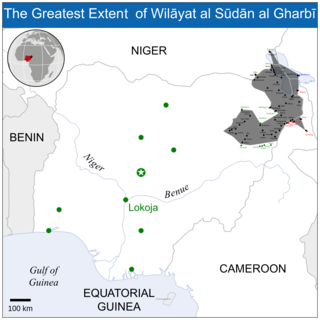
Islamic terrorism, Islamist terrorism or radical Islamic terrorism are terrorist acts against civilians committed by violent Islamists who have a religious motivation.

Katsina is a Local Government Area and the state capital of Katsina State in northern Nigeria. Katsina is located some 260 kilometres (160 mi) east of the city of Sokoto and 135 kilometres (84 mi) northwest of Kano, close to the border with Niger. In 2016, Katsina's estimated population was 429,000. The city is the centre of an agricultural region producing groundnuts, cotton, hides, millet and guinea corn and also has mills for producing peanut oil and steel. The city is largely Muslim, and the population of the city is mainly from the Fulani ethnic group.

Per Magnus Ranstorp is a Swedish scholar who has written about Hezbollah, Hamas, Al-Qaeda and other militant Islamic movements. He is the Research Director of the Centre for Asymmetric Threat Studies at the Swedish National Defence College, directing a project on Strategic Terrorist Threats to Europe which focuses on radicalisation and recruitment of salafist-jihadist terrorists across Europe and the convergence between Chemical, Biological, Radioactive and Nuclear Weapons and Terrorism. Ranstorp graduated from Gustavus Adolphus College in Saint Peter, Minnesota in 1985.
Islamic extremism, Islamist extremism or radical Islam is extremism associated with the religion of Islam. These are controversial terms with varying definitions, ranging from academic understandings to the idea that all ideologies other than Islam have failed and have demonstrated their bankruptcy, as well as political ones like the definition by the government of the United Kingdom which understands Islamic extremism as any form of Islam that opposes "democracy, the rule of law, individual liberty and mutual respect and tolerance of different faiths and beliefs".

Boko Haram, officially known as Jamā'at Ahl as-Sunnah lid-Da'wah wa'l-Jihād, and Wilāyat Garb Ifrīqīyā, meaning "West African Province", is a jihadist terrorist organization based in northeastern Nigeria, which is also active in Chad, Niger and northern Cameroon.

The Boko Haram insurgency began in 2009, when the jihadist group Boko Haram started an armed rebellion against the government of Nigeria. The conflict takes place within the context of long-standing issues of religious violence between Nigeria's Muslim and Christian communities, and the insurgents' ultimate aim is to establish an Islamic state in the region.

Abu Mohammed Abubakar bin Mohammad al-Sheikawi is a Kanuri man known as the current leader of Boko Haram, a Nigerian militant group that has declared loyalty to the Islamist militant group, Islamic State of Iraq and the Levant (ISIS). He served as deputy leader to the group's founder, Mohammed Yusuf, until Yusuf was executed in 2009.
Terrorism and social media refers to the use of social media platforms to radicalize and recruit violence and non-violent extremists.

The Vanguards for the Protection of Muslims in Black Africa, better known as Ansaru and less commonly called al-Qaeda in the Lands Beyond the Sahel, is an Islamic fundamentalist Jihadist militant organisation based in the northeast of Nigeria. It originated as faction of Boko Haram, but became officially independent in 2012. Despite this, Ansaru and other Boko Haram factions continued to work closely together until the former increasingly declined, and stopped its insurgent activities in 2015. Since then, Ansaru is mostly dormant though its members continue to spread propaganda for their cause.
The Global Terrorism Index (GTI) is a report published annually by the Institute for Economics and Peace (IEP), and was developed by IT entrepreneur and IEP's founder Steve Killelea. The index provides a comprehensive summary of the key global trends and patterns in terrorism since 2000. It is an attempt to systematically rank the nations of the world according to terrorist activity. The index combines a number of factors associated with terrorist attacks to build an explicit picture of the impact of terrorism, illustrating trends, and providing a data series for analysis by researchers and policymakers. It produces a composite score in order to provide an ordinal ranking of countries on the impact of terrorism.
Timeline of the Boko Haram insurgency is the chronology of the Boko Haram insurgency, an ongoing armed conflict between Nigerian Islamist group Boko Haram and the Nigerian government. Boko Haram have carried out many attacks against the military, police and civilians since 2009 – mostly in Nigeria, but also in Cameroon, Chad and Niger.

Quasi-state-level jihadist groups, including Boko Haram and the Islamic State of Iraq and the Levant, have captured and enslaved women and children, often for sexual slavery. In 2014 in particular, both groups organised mass kidnappings of large numbers of girls and younger women.

The core of the territory of the Islamic State of Iraq and the Levant was in Iraq and Syria where the proto-state controlled significant swathes of urban, rural, and desert territory. The Islamic State also controls territory in Afghanistan as well as Nigeria, possibly holds areas in Somalia, Mozambique, and the Democratic Republic of the Congo, and used to control land in Libya, the Philippines, Egypt, and Yemen. The group also has insurgent cells in India, Algeria, Iraq, Tunisia, the Caucasus, and Saudi Arabia that do not control territory. By late March 2019, ISIL territory in Syria was reduced to only the besieged 4,000 km2 (1,550 sq mi) Syrian Desert pocket. The enclave was surrounded by Syrian government forces and its allies. The Syrian military conducted combing operations and airstrikes against the pocket, but with limited success.

Starting in late January 2015, a coalition of West African troops launched an offensive against the Boko Haram insurgents in Nigeria.

The 2015 Chad suicide bombings were a suicide attack which occurred the afternoon of Saturday 10, October 2015 in the town of Baga Sola, Chad, a small fishing community on Lake Chad. The attack was allegedly perpetrated by the Nigeria-based Islamic extremist group Boko Haram and resulted in the deaths of around 36 individuals, and wounded upwards of 50 more. The attacks were reportedly carried out by two women, two children, and a man with the intended targets being a busy marketplace, and a nearby refugee camp hosting tens of thousands of Nigerians. It was the deadliest attack to take place in the Lake Chad region.
This article contains a timeline of events from January 2015 to December 2015 related to the Islamic State of Iraq and the Levant (ISIL/ISIS). This article contains information about events committed by or on behalf of the Islamic State, as well as events performed by groups who oppose them.
Online youth radicalization is the action in which a young individual, or a group of people come to adopt increasingly extreme political, social, or religious ideals and aspirations that reject or undermine the status quo or undermine contemporary ideas and expressions of the nation. As for radicalization, online youth radicalization can be both violent or non-violent.










